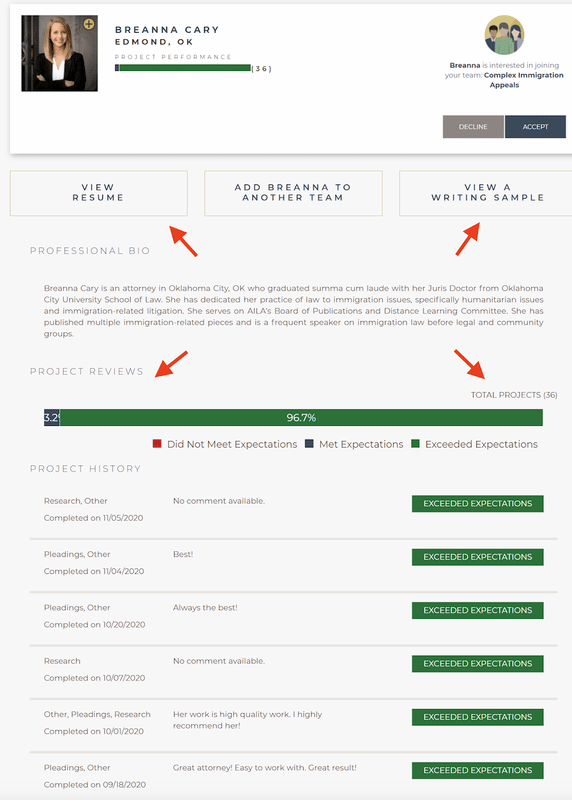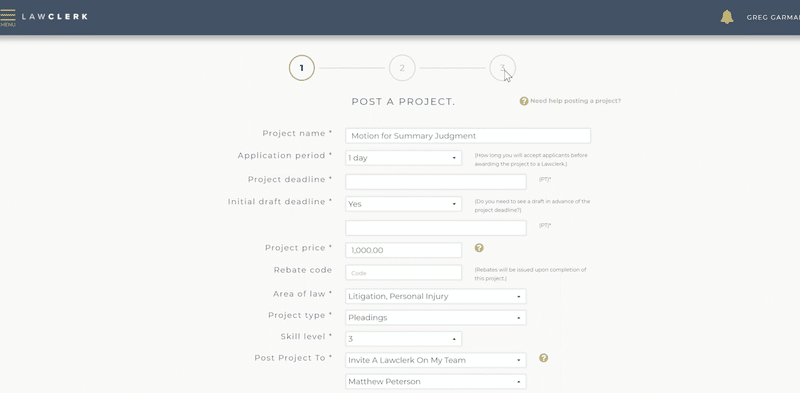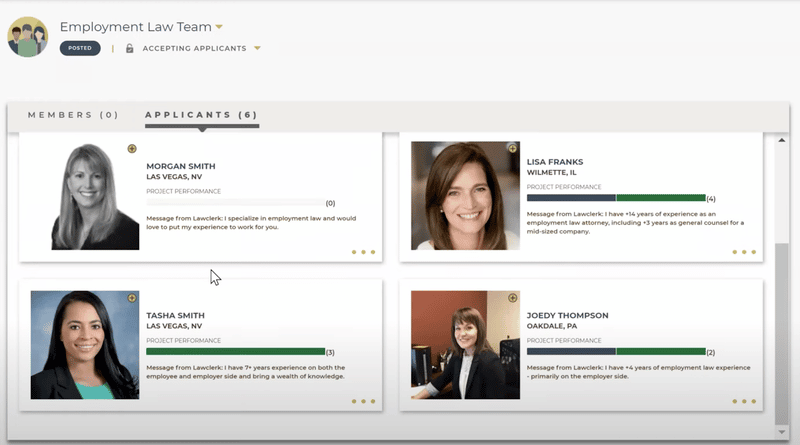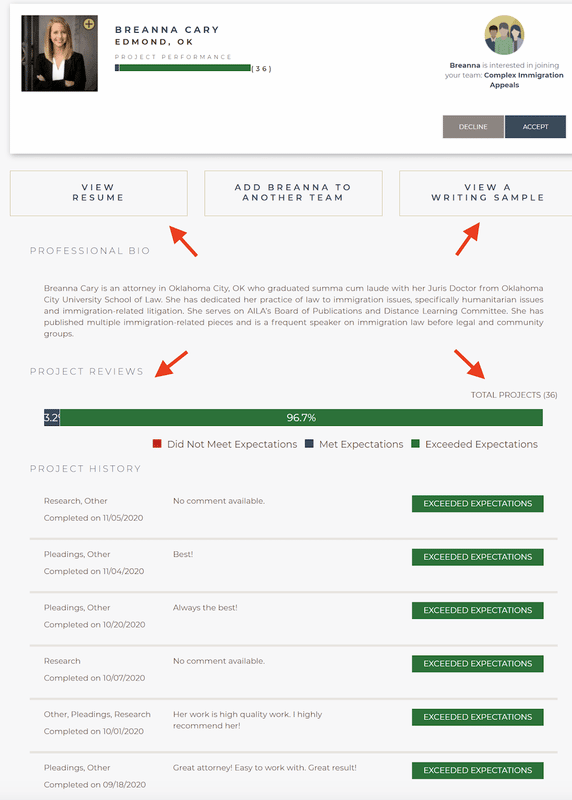There’s a lot of information out there about what it means to become a freelance lawyer, but there’s less about the nuances of trying to hire one. And if you’re trying to reduce overhead, increase profits, or simply create a more agile law firm business, you probably have questions about how hiring a freelance lawyer actually works.
You may be intrigued about the benefits of using freelance lawyers, but you may also be worried about any potential drawbacks. We get that, and we’d like to help clear up any misconceptions you may have.
In this post, we’ll cover the following pros and cons of using freelance lawyers to supplement your law practice:
The Pros of Using Freelance Lawyers
- Increase Profitability (Charge the Work of a Freelance Lawyer to the Client at a Reasonable Market Rate)
- Access to More Diverse Talent in All Areas of Law
- No-Strings-Attached Flexibility
- Better Work/Life Well-Being
- Significantly Lower Overhead
The Cons of Using Freelance Lawyers (And Why They’re Myths)
- It’s Intimidating to Try Something New
- It’s Near Impossible to Find Good Talent
- It Takes Too Much Time to Delegate
THE PROS OF USING FREELANCE LAWYERS
1. Increase Profitability (Charge the Work of a Freelance Lawyer to the Client at a Reasonable Market Rate)
According to the ethics rules, hiring attorneys can charge the work of a freelance lawyer to the client at a reasonable market rate.
This means that you can leverage the time of freelance lawyers to increase your law firm’s profitability, just like big firms have been doing for decades with traditional, in-house associate hires.
For example, let’s say you decide to outsource a motion for summary judgment to a freelance lawyer at a flat fee of $1,000.
The freelance lawyer reports working on that project for 12 hours. Based on the freelancer’s experience and your practice area in your market, you can bill those 12 hours to the client at a conservative $200 per hour.
That’s $2400 brought in, and only $1000 going to the freelancer — so an extra $1400 of revenue just for that one outsourced job.
And that’s both with the hourly rate of $200 being conservative, and with only one job. Imagine the additional revenue you could drive into your firm if you did that twice per month for an entire year — that would be an additional $33,600 per year, and without the overhead costs or headache tied to a full-time associate.
2. Access to More Diverse Talent in All Areas of Law
If you’ve considered hiring a full-time associate, you may have also considered what experience level you can afford and how that will affect the level of work the associate will be able to produce. And if your budget provides for a less-experienced attorney, it may take a while for them to get up to speed for the type of work you need done. In addition, that attorney may only have expertise in one area of law.
In comparison, with LAWCLERK, you have access to a network of over 3,000 freelance lawyers in nearly every conceivable area of law, and the majority of them have been practicing for at least 5 to 10 years. They’ve lived cases, done the work, and can draw on that experience to do phenomenal work for you.
Not only does this wide variety of attorneys allow you to fill each specific need as it arises, it also allows freelancers to complete much more work in a shorter amount of time than one associate would be able to. LAWCLERK customer Morris Fischer knows this firsthand:
“The biggest thing is not just price control, it’s that I can have seven projects going at once. There’s no one associate that can do that.”
– Morris Fischer, Employment and Business Lawyer
Another LAWCLERK customer has built up her practice to handle a different area of law each day of the week — by focusing on family law on Mondays, DUIs on Tuesday, etc., she has been able to expand her practice to cover much more ground.
One way to do this is by using the LAWCLERK Teams feature. You can build a robust team of freelance lawyers for a specific project and know that each facet of it will be covered by someone with specific expertise and experience in the areas required.
How can you ensure you’ve found a freelance lawyer with the right expertise and experience?
When you post a project on our marketplace, each freelance lawyer that applies has a profile that includes their:
-
Resume and bio
-
Writing sample
-
Total number of projects completed
-
Reviews received for completed projects from hiring attorneys on our marketplace

3. No-Strings-Attached Flexibility
If you’ve never hired anyone before, rather than worrying about what the cost might do to your overhead — or whether you’ll be able to sustain it if business slows down — you can start small with contract help.
Additionally, if you ever need to ramp up how much help you’re getting, rather than asking a full-time associate to take on additional work, you can just add another freelance attorney to your team, on a case-by-case basis. (This can also help avoid burnout for both you and any associates you may already be working with).
4. Better Work/Life Well-Being
Many of the lawyers we speak to stay up late working every night and pull several all-nighters each month. They’re on the fast track to total exhaustion.
By using freelance lawyers, you lessen the amount of hours you have to work on a regular basis, giving you more time out of the office to do the things you enjoy most.
We hear all the time from hiring attorneys that they wish our freelance lawyer marketplace existed five years sooner, because they desperately needed an extra set of hands to improve their work/life well-being, but didn’t want to take on the overhead costs and risks involved with hiring a full-time associate.
5. Significantly Lower Overhead
Perhaps the most appealing benefit of hiring freelance lawyers is the significant savings in overhead expenses.
Rather than paying for a full-time associate, you’re only paying for the talent and the work you need, and only when you need it.
This means you’re not paying for:
-
Full-time salaries.
-
Benefits.
-
Bar dues.
-
Continuing education fees.
-
Insurance.
-
Office space.
-
Equipment.
-
Practice management software tools.
-
Legal research software fees.
-
And so on.
THE CONS OF USING FREELANCE LAWYERS (And Why They’re Myths)
1. It’s Intimidating to Try Something New
Far too many attorneys put off delegating legal work to freelance lawyers because it seems like a new and different concept, which can be intimidating.
But the fact of the matter is that attorneys have been getting sporadic help in a similar method for decades via what we’ve traditionally called a “contract lawyer”.
Contract Lawyer Downsides
There are several problems that can arise with the traditional method of relying on contract lawyers:
-
What if they don’t have the specific expertise you need for the case?
-
What if they’re busy and not taking on any more work right now?
-
What if they charge you an arm and a leg for the work?
Finding a contract attorney that ticks all three of these boxes is incredibly challenging, and you can waste a lot of time calling folks in your network or the state bar without any luck.
That’s why we decided to launch a freelance lawyer marketplace and develop technology to make it easier for you to find and connect with the right type of talent, when you need it, without doing hours of legwork.
With the click of a mouse, you can quickly:
-
Post a project.

-
Have a number of qualified freelance lawyers apply (note: on average, 12 candidates apply to each project that’s posted on our marketplace).

-
Easily review their credentials and pick the best person for the job.

It costs you nothing to sign up and post a project, and our customers nearly always find someone with the right talent and expertise for the job, due to our large network of over 3,000 freelance lawyers.
In addition, every customer that signs up gets assigned a Dedicated LAWCLERK Advisor (at no cost) who serves as a concierge that’s there to coach you through posting a project, helping you price it, and answer any questions you may have about legal outsourcing.
2. It’s Near Impossible to Find Good Talent
There’s a common misperception that lawyers who choose to freelance simply couldn’t get a “real” job. But the reality is that the traditional legal career leaves many dissatisfied with its long hours and lack of flexibility. There are incredibly talented lawyers who don’t want to work in a full-time capacity at a law firm, and would rather have the personal freedom to work where and when they want.
For example, some of the freelance lawyers on our marketplace include…
-
Military spouses, who may often need to relocate and therefore find the flexibility of freelancing easier than restarting at a new local practice every time they move.
-
Attorneys who want to spend more time with their family.
-
Former “big law” attorneys, who have worked in upper-echelon practices but who are sick of the rat race of trying to make partner, and who would rather have a more flexible career path.
-
Retired or semi-retired attorneys, with plenty of experience but who only want occasional work.
-
Law school professors, who have dedicated their lives to learning one specific area of law but who still like to collaborate on cases occasionally.
-
And so on (these are just a very few examples of attorneys who are charting their own career path and making choices that are best for them and their families).
Time after time, hiring attorneys who post their first project on our marketplace reach out to us to express their surprise and satisfaction with the experience level, credentials, and talent level of the freelance lawyers who apply.
3. It Takes Too Much Time to Delegate
Many of the attorneys we speak to say something along the lines of, “It takes too much time to delegate and explain the task, so I’ll just do it myself”. But when you break this down, especially in the context of substantive legal work, it usually isn’t true.
For example, say you have a complex opposition that you need to write to a motion. And say it takes 30 minutes to give instructions, provide relevant documents, type up a summary, and talk with a freelance lawyer to set them up to begin drafting that opposition.
Then, the freelance lawyer works around 7 or 8 hours to draft this opposition. Following that, you spend around an hour reviewing, editing, and providing a few additional facts in order to finalize the document to submit to your client and then to the court.
Your total time invested there is around 1.5 hours total, instead of the 7 or 8 hours it would have taken you to write the motion yourself. This allows you to focus on the tasks that are the highest and best use of your time, such as meeting with potential new clients, going to trial, and so on.
Interested in Learning More About Our Freelance Lawyer Marketplace?
We answer some of the most commonly asked questions we get here.
In addition, see our attorney resources page, where you can find:
Sample legal projects by areas of law
In-depth guide to legal outsourcing
Ideas of work to delegate
And much more!
You May Also Like…



















